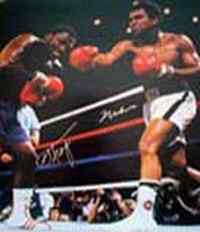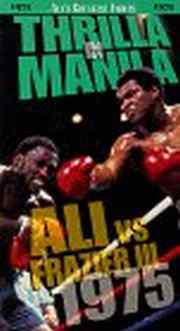
|
Philippines, 28 Feb 2026 |
Home >> News |
 |
||||
|
|
|
|
BEST HEAVYWEIGHT FIGHT EVER: PHILBOXING.COM REMEMBERS "THRILLA IN MANILA" By Salven L. Lagumbay PhilBoxing.com Sat, 01 Oct 2005  October 1 will always be remembered as the day when Muhammad Ali and Joe Frazier waged what is widely regarded as the best heavyweight fight ever, the Thrilla in Manila. To most young people, the event is just but one of those great events in boxing. But to boxing itself, and to those who were lucky enought to be around when it happened, it was a special gift to the sport--a gift that will never be forgotten. On Sunday, Main Event, which will be aired over RPN-9 starting 1PM, will present part I of a Thrilla in Manila Special. The program will feature, among many other things, an interview with renowned Filipino referee Sonny Padilla, Big Dome owner George Araneta, Ramy Diez, Louie Tabuena, and Ali's visit to Malacanang Palace where he met gracious host Ferdinand Marcos and then First Lady Imelda Marcos.  Philboxing.com remembers "Thrilla in Manila" through the following priceless quotes from "Ali: The Greatest, quotes from people who chronicled Ali's life, and those close to The Louisville Lip: Philboxing.com remembers "Thrilla in Manila" through the following priceless quotes from "Ali: The Greatest, quotes from people who chronicled Ali's life, and those close to The Louisville Lip:BERT SUGAR: Unfortunately, Ali brought the wrong wife to that one. And Marcos was always referring to her as Mrs. Ali, when Belinda was home and this was Veronica. JOURNALIST: I was interviewing Muhammad when his wife, Belinda, arrived from the United States, having read all the reports in the newspaper, that he was going around accompanied by a woman named Veronica, who obviously was not Belinda. She came to confront him and walked into the middle of the interview and he excused himself and the two of them went behind closed doors. FERDIE PACHECO: Ali's whole fight was to keep Joe Frazier off at the end of his jab. Joe's thing is to get under here and move this aside and get here. By the 14th round, he had paid the price so many times, he could no longer get under there. His face looked like it exploded; his eyes were all skinny. He couldn't see him. He had so much fluid and blood in his face that it was squishing around. And when he had him set up, he'd land that right hand. Joe went back on his heels. Problem solved. BERT SUGAR: Frazier was a blind man groping for him and Eddie Futch stopped it between rounds, AN ACT OF COMPASSION RATE TO BOXING. KRAM: Futch, one of the great trainers in the world, who had seen four fighters killed in the ring, decided it wasn't worth it and said, "Sit down, son, its all over." FERDIE PACHECO: To my mind it was the best heavyweight fight I've ever seen in my life, and the closest to death that both fighters came. I dont know whether that's praise or not, because death should not enter into a sporting event, but it did. JOSE TORRES: Every champion had to experience the feeling that he's dying. And Ali had that feeling in that fight. FERDIE PACHECO: It's the exhaustion you see when anyone's dehydrated, that's been through an incredible debilitating disease. Your acid base balance is gone, for example. Your cardiac condition, you've exhausted your heart. You gotta get the fluid balance. All of that's reflected in the brain, which floats in a bed of water. Lose the water, and you've got problems with your brain. On top of that, somebody's pummeling you. It's bad enough to be exhausted, but exhausted and beaten is a high level of getting ready to die. KRAM: Ali went to Manila as an 'is' but left as a 'was'. The game was over. It was all over. He knew it. He took my hand and rubbed my fingers over his forehead and there was a ridge of bumps on it. Hew was very worried about brain damage. He should have called it the end, yet he continued on. Why? Was it ego? No, I don't think it was ego. Finances? Quite possibly. He had a lot of people to take care of. JOURNALIST. Everybody around him wanted money from him. He tried to be very generous. He was very generous. But he got ripped off for a huge amount and after a while he wasnt upset about losing the money as that he realized those people werent really friends. FERDIE PACHECO: Plus, he had the Muslims and everybody that had built him into a business and and living, that needed him to fight to continue to live, all these hangers-on that he had, there's 30 or 40 guys. He quits, they're out of work, they're out of work. They're out of a check. Everybody wants him to continue. BERT SUGAR: It was clear that Ali was over the hill times three and that he couldnt find his prime in his rear view mirror behind him. KRAM: So he went on and on like an actor who has to, who's stuck in a play and has to play, go on playing scene by scene by scene. TOM JONES: It's like a drug. You get used to that. You want to take your talent as far as it possibly can go. And sometimes you dont know when that time is. It'll tell you, like with a singer, when you cant sing as well. You think, "I cant do it," and you stop. Whereas with an athlete, he's got to be pushed to that end, where he then knows that he cant do it. That's where Ali took it as far as he possibly could. END Click here to view a list of other articles written by Salven L. Lagumbay. |
|
|
PhilBoxing.com has been created to support every aspiring Filipino boxer and the Philippine boxing scene in general. Please send comments to feedback@philboxing.com |
PRIVATE POLICY | LEGAL DISCLAIMER
developed and maintained by dong secuya © 2026 philboxing.com. |